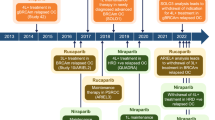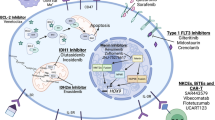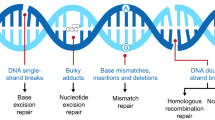Abstract
Purpose
BRCA1 and BRCA2 proteins are central to DNA repair process through homologous recombination. We hypothesize that BRCA1/BRCA2 mutation carriers may exhibit increased hematological toxicity when receiving genotoxic chemotherapy.
Methods
We included women with primary breast cancers screened for BRCA1/BRCA2 germline mutations and treated with (neo)adjuvant chemotherapy in Geneva (Swiss cohort). The primary endpoint was the incidence of febrile neutropenia following the first chemotherapy cycle (C1). Secondary endpoints were the incidence of grade 3–4 neutropenia, grade 4 neutropenia and hospitalization during C1, G-CSF use and chemotherapy dose reduction during the entire chemotherapy regimen. Long-term toxicities (hematological, cardiac and neuropathy) were assessed in the Swiss cohort and a second cohort of patients from Lyon (French cohort).
Results
Overall, 221 patients were assessed for acute hematological toxicity, including 23 BRCA1 and 22 BRCA2 carriers. Following the C1, febrile neutropenia had an incidence of 35% (p = 0.002), 14% (p = 0.562) and 10% among BRCA1, BRCA2 and non-carriers, respectively. Grade 4 neutropenia was found in 57% of BRCA1 (p < 0.001), 14% of BRCA2 (p = 0.861) and 18% of non-carriers. G-CSF support was necessary in 86% of BRCA1 (p = 0.005), 64% of BRCA2 (p = 0.285) and 51% of non-carriers. For long-term toxicity analysis, 898 patients were included (167 BRCA1-, 91 BRCA2- and 640 non-carriers). There was no difference between the 3 groups.
Conclusions
BRCA1 germline mutations is associated with greater acute hematological toxicity in breast cancer patients. These observations could have implication for primary prophylaxis with G-CSF.

Similar content being viewed by others
References
Foulkes WD (2008) Inherited susceptibility to common cancers. N Engl J Med 359(20):2143–2153
Kuchenbaecker KB et al (2017) Risks of breast, ovarian, and contralateral breast cancer for BRCA1 and BRCA2 MUTATION CARRIERS. JAMA 317(23):2402–2416
Venkitaraman AR (2002) Cancer susceptibility and the functions of BRCA1 and BRCA2. Cell 108(2):171–182
Nik-Zainal S et al (2016) Landscape of somatic mutations in 560 breast cancer whole-genome sequences. Nature 534(7605):47–54
Roy R, Chun J, Powell SN (2011) BRCA1 and BRCA2: different roles in a common pathway of genome protection. Nat Rev Cancer 12(1):68–78
Moynahan ME, Jasin M (2010) Mitotic homologous recombination maintains genomic stability and suppresses tumorigenesis. Nat Rev Mol Cell Biol 11(3):196–207
Prakash R et al (2015) Homologous recombination and human health: the roles of BRCA1, BRCA2, and associated proteins. Cold Spring Harb Perspect Biol 7(4):a016600
De Picciotto N et al (2016) Ovarian cancer: status of homologous recombination pathway as a predictor of drug response. Crit Rev Oncol Hematol 101:50–59
Konishi H et al (2011) Mutation of a single allele of the cancer susceptibility gene BRCA1 leads to genomic instability in human breast epithelial cells. Proc Natl Acad Sci USA 108(43):17773–17778
Sedic M et al (2015) Haploinsufficiency for BRCA1 leads to cell-type-specific genomic instability and premature senescence. Nat Commun 6:7505
Baert A et al (2016) Increased chromosomal radiosensitivity in asymptomatic carriers of a heterozygous BRCA1 mutation. Breast Cancer Res 18(1):52
Pathania S et al (2014) BRCA1 haploinsufficiency for replication stress suppression in primary cells. Nat Commun 5:5496
Drooger JC et al (2016) Toxicity of (neo)adjuvant chemotherapy for BRCA1- and BRCA2-associated breast cancer. Breast Cancer Res Treat 156(3):557–566
Huszno J et al (2013) The influence of BRCA1/BRCA2 mutations on toxicity related to chemotherapy and radiotherapy in early breast cancer patients. Oncology 85(5):278–282
Shanley S et al (2006) Acute chemotherapy-related toxicity is not increased in BRCA1 and BRCA2 mutation carriers treated for breast cancer in the United Kingdom. Clin Cancer Res 12(23):7033–7038
NCI (2010) Common Terminology Criteria for Adverse Events V4.0. https://evs.nci.nih.gov/ftp1/CTCAE/About.html
Institute NC (2016) CTCAE v4.0
Crawford J et al (1991) Reduction by granulocyte colony-stimulating factor of fever and neutropenia induced by chemotherapy in patients with small-cell lung cancer. N Engl J Med 325(3):164–170
Lyman GH et al (2010) Risk of mortality in patients with cancer who experience febrile neutropenia. Cancer 116(23):5555–5563
Lyman GH, Abella E, Pettengell R (2014) Risk factors for febrile neutropenia among patients with cancer receiving chemotherapy: a systematic review. Crit Rev Oncol Hematol 90(3):190–199
Vogel CL et al (2005) First and subsequent cycle use of pegfilgrastim prevents febrile neutropenia in patients with breast cancer: a multicenter, double-blind, placebo-controlled phase III study. J Clin Oncol 23(6):1178–1184
Summers C et al (2010) Neutrophil kinetics in health and disease. Trends Immunol 31(8):318–324
Labidi-Galy SI et al (2018) Location of mutation in BRCA2 gene and survival in patients with ovarian cancer. Clin Cancer Res 24(2):326–333
Kotsopoulos J et al (2018) BRCA mutation status is not associated with increased hematologic toxicity among patients undergoing platinum-based chemotherapy for ovarian cancer. Int J Gynecol Cancer 28(1):69–76
Dhawan MS et al (2017) Differential toxicity in patients with and without DNA repair mutations: phase I study of carboplatin and talazoparib in advanced solid tumors. Clin Cancer Res 23:6400–6410
Drost R et al (2011) BRCA1 RING function is essential for tumor suppression but dispensable for therapy resistance. Cancer Cell 20(6):797–809
Drost R et al (2016) BRCA1185delAG tumors may acquire therapy resistance through expression of RING-less BRCA1. J Clin Invest 126(8):2903–2918
Friedenson B (2007) The BRCA1/2 pathway prevents hematologic cancers in addition to breast and ovarian cancers. BMC Cancer 7:152
Le Deley MC et al (2007) Anthracyclines, mitoxantrone, radiotherapy, and granulocyte colony-stimulating factor: risk factors for leukemia and myelodysplastic syndrome after breast cancer. J Clin Oncol 25(3):292–300
Coombs CC et al (2017) Therapy-related clonal hematopoiesis in patients with non-hematologic cancers is common and associated with adverse clinical outcomes. Cell Stem Cell 21(3):374–382 e4
Bowman RL, Busque L, Levine RL (2018) Clonal hematopoiesis and evolution to hematopoietic malignancies. Cell Stem Cell 22(2):157–170
Iqbal J et al (2016) The incidence of leukaemia in women with BRCA1 and BRCA2 mutations: an International Prospective Cohort Study. Br J Cancer 114(10):1160–1164
Sucheston LE et al (2011) Genetic predictors of taxane-induced neurotoxicity in a SWOG phase III intergroup adjuvant breast cancer treatment trial (S0221). Breast Cancer Res Treat 130(3):993–1002
Shah A et al (2018) Incidence and disease burden of chemotherapy-induced peripheral neuropathy in a population-based cohort. J Neurol Neurosurg Psychiatry 89(6):636–641
D’Argenio V et al (2015) The molecular analysis of BRCA1 and BRCA2: Next-generation sequencing supersedes conventional approaches. Clin Chim Acta 446:221–225
Acknowledgements
We thank all the patients who agreed to participate to this study. We thank Dr A. Hugli, Dr M. Forni, Dr B. Exquis, Dr C. De Pree, Dr C. Irle, Dr L. Waelchli and Prof. A.-P. Sappino for providing clinical data. We thank Mrs L. Zulianello for the iconographic support.
Funding
A. F. received a Grant from the Fondation Henriette Meyer.
Author information
Authors and Affiliations
Corresponding author
Ethics declarations
Conflict of interest
The authors declare that they have no conflict of interest.
Ethical approval
All procedures performed in studies involving human participants were in accordance with the ethical standards of the institutional and/or national research committee and with the 1964 Helsinki Declaration and its later amendments or comparable ethical standards. The study complies with the current laws in Switzerland and France.
Informed consent
Informed consent was obtained from all alive participants included in the study in Geneva. For this type of study, formal consent is not required.
Electronic supplementary material
Below is the link to the electronic supplementary material.
Rights and permissions
About this article
Cite this article
Friedlaender, A., Vuilleumier, A., Viassolo, V. et al. BRCA1/BRCA2 germline mutations and chemotherapy-related hematological toxicity in breast cancer patients. Breast Cancer Res Treat 174, 775–783 (2019). https://doi.org/10.1007/s10549-018-05127-2
Received:
Accepted:
Published:
Issue Date:
DOI: https://doi.org/10.1007/s10549-018-05127-2




